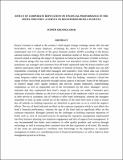Effect of corporate reputation on financial performance in the hotel industry: A survey of registered hotels in Kenya
Abstract
Kenya’s tourism is ranked as the country’s third largest foreign exchange earner after tea and horticulture, and a major employer, accounting for about 12 percent of the total wage employment and 13.7 percent of the gross domestic product (GDP) according to the Kenya national tourism strategy 2013-2018. Corporate reputation studies in Kenya are dismal and this research aimed at studying the impact of reputation on financial performance of hotels in Kenya. The research design that was used in this research was descriptive survey method. The target population was managers and customers from 49 hotels registered under the Kenya hoteliers and caterers association which is under the ministry of tourism in Kenya. The sample size was 420 respondents, consisting of both hotel managers and customers, from whom data was collected using questionnaires. Data was analyzed using the statistical program satat version 13, presented using frequency tables, bar graphs and pie charts. From the findings, customers viewed the image of their choice hotel positively through various aspects of the hotel. Some of the indicators of positive image were: quality products and services, trained employees, outperforming competitors, as well as responsible use of the environment by the hotel. Managers’ survey indicated that they maintained their hotel’s image by carrying out audits. Customers gave indicators of positive identity as; the level of motivation of the employees which was portrayed in their service to customers, use of website to offer hotel information, whereas the managers responded to have an audit carried out on the identity of the hotel from time to time to ensure that all setbacks in building reputation are identified in good time so as to avoid the negative effects. The size of hotel indicated an effect on the corporate reputation which in turn affects the hotel’s financial performance, whereas the age of the hotel had no significant effect on the corporate reputation. Managers pointed out the challenges to building corporate reputation of hotels such as, lack of structured process for getting the reputation management implemented into their business planning, low employee engagement and lack of support from management. It was recommended that hotels must endeavour to offer quality products and services through technology as well as ensuring their customers have the best experience at all times. The results of this study are anticipated to contribute more knowledge on the importance of reputation management in hotels as a contributing factor to financial performance: as well as improve hotel management practices in Kenya.
Publisher
Africa Nazarene University

